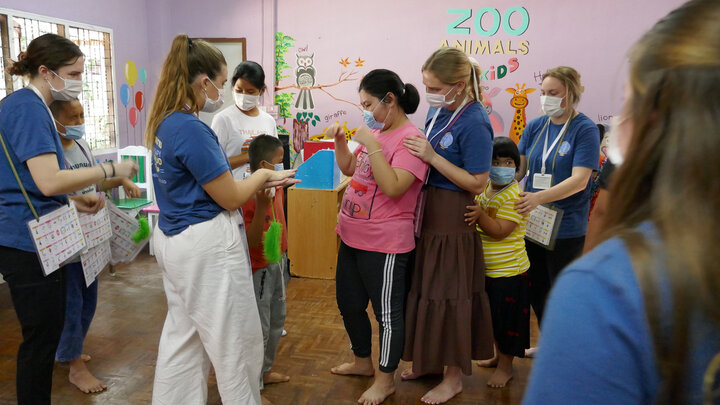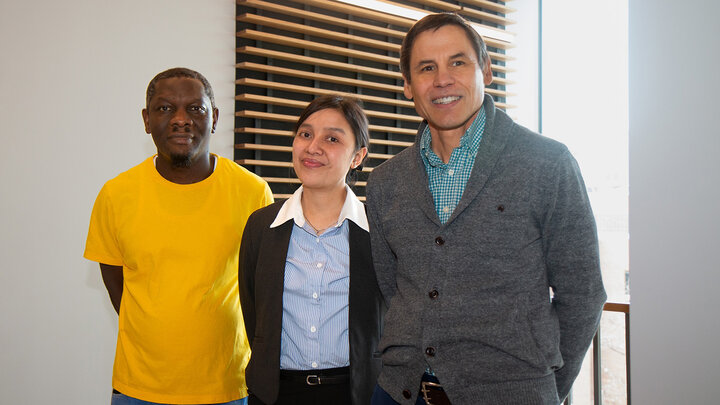Elsa Wilcox is a junior from McCook, Nebraska. She is majoring in communication sciences and disorders with minors in gerontology and educational studies. In this blog she shares about her experience traveling to Thailand in January as part of the two-week faculty-led Nebraska abroad program, "Experiencing Speech-Language Pathology with Therapy Abroad."
Studying speech-language pathology in Chiang Mai, Thailand, has been one of the most eye-opening experiences I have had yet. I wanted to go on this trip for the fun excursions, but more so because I have never been fully immersed into a completely foreign country with a foreign language and culture until this trip. I was really looking forward to observing speech-language pathology practices in a foreign place as well.
In my mind, my trip was split into two different parts, excursions and clinicals, with language and culture scattered across both parts. Some of my favorite excursions included hiking beautiful trails to Buddhist temples, visiting an elephant home, attending a Thai boxing and yoga class, and embracing my inner chef through a Thai cooking class. Although I really loved riding on the trunk of an elephant, my most favorite moments were spent in our red taxi cabs asking our wonderful tour guide, Fai, all about the culture and history of Thailand.
We spent one day in a Thai language lesson. Thai uses several vowels that English does not use. It was difficult for us to try and speak Thai correctly and grasp the idea of new vowels. An interesting parallel one of the other UNL students mentioned is how we felt similar to how our clients might feel here in the U.S. when speaking certain sounds doesn't just come naturally. Our language lesson helped me to understand how my future clients might be feeling when they are struggling with language, frustrated and defeated.
Experiencing speech-language pathology and augmentative and alternative communication (AAC) in Thailand really made me appreciate the resources and services available here in the United States. Most Thai people accept the idea that individuals with special needs and disabilities should spend their life at home comfortably, rather than being engaged in society and receiving services. The schools in Thailand are not equipped for those populations, so individuals with disabilities do not attend school. I learned that speech-language pathology is still a relatively new and small field in Thailand. A shocking and sad fact we learned is that there are only 0.24 SLPs for every 100,000 Thai people.
One of our days was spent at Nong Peung, a residential school for individuals with special needs. We visited 8 children with varying disabilities that were all non-verbal. We introduced AAC to them, which may have been the first time some of the children had access to any form of communication. They were very eager to use AAC core boards and "use their voices" for the first time! Three of our days were spent at the Dulabhatorn Foundation (DBF), which is a facility that provides service to individuals with special needs to improve their quality of life through advocacy, support and some therapies. Here, we were paired with AAC users to learn more about some of their favorite things. We imputed things like favorite foods, activities and places into the devices for more personalized usage. Students from Chiang Mai University served as translators during part of our time at DBF. This was my first time using a translator, which will always be an unforgettable experience for me as it took lots of patience and practice to make the interaction smooth. Through this experience, I learned the importance of flexibility and adaptability. I ended up throwing out all of my plans and having to come up with different techniques throughout our visit on the fly. Towards the end of our trip, we took the individuals from DBF on a field trip to a department store for a scavenger hunt and as a time to practice using their AAC devices. It was amazing to witness the AAC users visit a place they had never been and to be able to finally communicate their wants by using their devices. During this trip, I learned about building trust with clients and caregivers. Even with a language barrier, it was possible. We all ended up becoming AAC users for the time being!
It really fills me with joy knowing that we made an unforgettable impact on some of these individuals and their families, even if it was just showing them attention that they aren't used to getting from their society. In my two-week trip abroad, I feel as though I have learned just as much from this hands-on experience as I have in my undergraduate studies. I have already noticed some positive changes in my life that I attribute to this trip. I have found myself being more patient with myself and others, soaking in the current moments rather than worrying about the past or future, and feeling much more grateful for every little opportunity I am blessed with here in the United States. I could really see myself returning to Thailand someday to volunteer alongside incredible advocates in order to share western technologies and services to this population.
College of Education and Human Sciences
Special Education and Communication Disorders
CEHS Global Experiences




